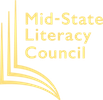By Karen W. Loerch, Literacy Coordinator, The Mid-State Literacy Council
A content young man is listening to his favorite movie. He is also listening to a repetitive sound that will be a marker to see how his brain works. A research team at Northwestern, headed by Neurobiologist Nina Kraus, has found a biomarker to predict reading success. Sounds like science fiction, right? Well listen to the research and you may be convinced. “To understand how the test works,” she says, “you need to understand that reading begins not with our eyes but with our ears, as we hear and catalog speech sounds. It’s hard work. Everything we hear, our brains have to process, separating the stuff that’s meaningful from pure noise. And they do it in microseconds.”
The research team’s work capitalized on the known fact that neural markers have already been found in adults that predict literacy development. The team wanted to see if these same predictors were present in preschool, and school aged children. The 112 subjects (ages 3–14) were tested to see if the neural markers for phonology could be identified in a noisy environment. Kraus tested one group of 3-year-olds, then tested them again at 4 years, and was able to predict language ability. When the team tested older students as old as 14, they were able to predict reading skill as well as predicting learning disabilities.
To be able to harness this information and then teach prescriptively to help a student overcome these initial weaknesses could prevent a school age student’s future for failure. Now we await the eventual longitudinal study to see what literacy journeys might occur for these participants. I am very eager to continue following their future paths for more evidence of the study’s success.
I am still in the field of reading intervention. Serving as a Literacy Coordinator, I recommend teaching materials and techniques in Reading, Math and Health for my tutors. Working with adult students, I see the frustrations and redeemed spirits when a student is learning to read. Our caring tutors use varied teaching approaches to help their hesitant adult students learn. One of our students was resistant, tired, disinterested in reading due to tracking into Special Education as a youngster. He used every tactic to resist learning from his tutor. My suggestions were to get to know his interests, start at the beginning, congratulate the tiniest successes, catch him at his happiest, switch gears when you see his spirit waning.This started to move Dan in the right direction. The most recent success was when Dan brought in a book he wanted to read. The remarkable coincidence was that Dan volunteers at a Food Bank where I deliver our gently used book donations. My flyer was in it, so Dan thought he could read it. His tutor said he read the entire book smiling the entire time.The tutor shared, “I had tears in my eyes because now all he wants to do is read.”
Challenges are inevitable in teaching students to read; my hope is that no student feels left behind and always has the best opportunities to learn. We are looking forward to learning more about this research about the biomarker for reading.
References
Turner, C. (2015, July 21). The test that can look into a child’s (reading) future.
Retrieved from https://www.npr.org/sections/ed/2015/07/21/423260864/the-test-that-can-look-into-a-childs-reading-future
White-Schwoch, T., Carr, K., Thompson, E., Anderson, S., Nicol, T., Bradlow, A.,…
Kraus, N. (2015, July 14). Auditory processing in noise: A preschool biomarker for literacy. Retrieved from https://journals.plos.org/plosbiology/article?id=10.1371/journal.pbio.1002196



